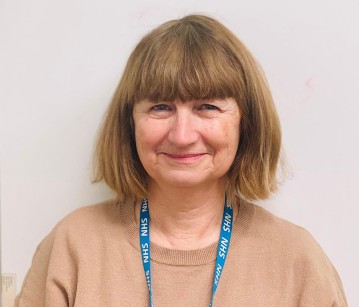A professional view: Jackie Fosbury was the Psychotherapy Lead for the programme Diabetes Care for You. Jackie has worked as a psychotherapist and has recently retired from her work at Sussex Community NHS Foundation Trust. Before retiring, Jackie kindly wrote this piece to talk about her final weeks as a psychotherapist.

This week, 1st February, after 30 years working as a diabetes psychotherapist I am seriously thinking about my retirement date. I have several goodbyes in the diary, but I shall be very sad to leave our service.
A day in clinic - taking care of myself - to take care of others
I know that every day will be busy but that there will never be something I haven’t heard before. I like to get into work early, to sort out my laptop and paperwork before the clinic begins. I like to make sure I have food snacks on hand, as those I speak with want to discuss food, normally about not eating or overeating and omitting insulin, and I find after a session I am usually obsessing about food.
Psychotherapists leave recovery gaps between patients. We are dealing with very raw, disturbing issues and memories every day, so apart from needing to write up the notes after the session, we need to shed the previous session and prepare emotionally for the next person we see. We must not transfer feelings or thoughts about one person onto the next. I often do a bit of deep breathing to prepare, this is referred to as ‘grounding’. This helps, particularly when listening to any forms of abuse and subsequent self-harm.
One to one interaction
On this day I saw two people, both were type 1 for an hour and a half each. You might think, ‘what a luxury’, how much work I could do with them to improve their diabetes management if only I had 90 minutes instead of 10. Well, my patients have had years of these 10-minute conversations, and it’s made no difference to the way they manage their condition.
"Knowledge and even the magic wand - a Freestyle Libre - have made no difference. That’s why they are referred to the psychotherapy team. Freestyle Libre are a ‘GAME CHANGER’ but the people referred to our service do not act on the results – for emotional reasons."
Patient 1 was new to me and an assessment. We went through their past experiences – of neglect, of indifferent care and how those experiences became internalised so that they were indifferent to themselves about their diabetes management. They said ‘not bothering’ about their diabetes was just a habit and they wanted to break it. We looked at their past experiences - which they complained about. However, they were shocked when I summarised this information around how they manage themselves, their children and their diabetes, and how diabetes becomes a vehicle for poor self-treatment.
We ended the assessment by looking at a ‘negative cognition’ – the thoughts that dominate a person’s life – often derived from these early negative experiences. This person subsequently formulated a ‘positive cognition’ just to think about during the next week. I will see this person again in a couple of weeks which will be Cognitive Analytic Therapy based (CAT).
The next person with diabetes, patient 2, (after my breath-work and a quick tea, infection control, change of mask) was someone in treatment with me. They come from a family of high-risk takers who took their risks too far. The patient was newly diagnosed and after keeping herself safe for 40 years suddenly felt very unsafe on diagnosis. She was tearful, highly anxious and had several falls as she couldn’t think what she was doing. We are doing a mix of CAT and EMDR (Eye Movement Desensitisation and Reprocessing). One of the things we are practicing is safe place installation, an EMDR technique. The patient’s life was and is full of tragedy, and she saw her diagnosis as a tragedy. It has made her so extremely anxious she can’t think straight or take in diabetes information. So, her parasympathetic nervous system needs significant calming; this is working well. We found her comfort zone and ‘protective figure’ so she is much calmer and can work out her blood glucose levels.
Finishing off the day
After writing up the patient’s notes, I had a short break and went to the clinical corridor to see colleagues. One colleague wanted me to have a brief lunch break, but I wanted to prepare for a meeting with our service manager. That was an hour of ‘how am I?’, ‘how is the psychotherapy team’ and ‘what’s going wrong’ if anything and signing off anything, as we count the days before I retire.
By 4pm, I was pretty tired with three solid hours of emotional patient time, over an hour on their notes, an hours meeting, it felt like I blinked, and it was late afternoon! Before finishing there were a few emails to write to other members of the psychotherapy team. I leave work with a pressure headache normally thinking about the mental and physical health risk we have to deal with every day. There will be some comfort however, when I have wine tonight with friends. When I retire, Tuesday will be the new Friday. Nearly there!
Names and details have been changed to protect confidentiality. The views and opinions expressed in this article and do not reflect the position of Sussex Community NHS Foundation Trust or Diabetes UK as a charity or any of its staff members.
If you are a healthcare professional and would like to write for News & Views, please contact healthcare@diabetes.org.uk with an outline of your idea.
